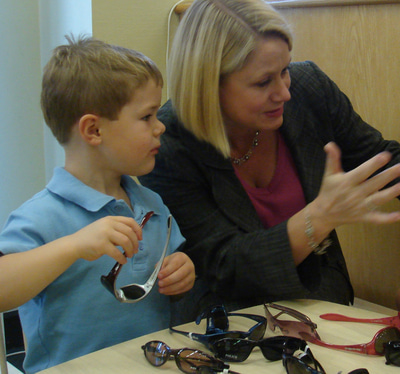- OT
- Life in practice
- Career development
- “I have been aware of the profession for as long as I can remember”
A to optometry
“I have been aware of the profession for as long as I can remember”
Henry Ranger, second year optometry student at City, University of London, shares how family inspired his journey into optometry
4 min read

02 October 2022
When did you first become aware of the profession?
I have been aware of the profession for as long as I can remember. My parents acquired the practice, Hammond and Dummer, a year after I was born. It has been a part of my life ever since.What were the main reasons you wanted to become an optometrist?
I have always wanted to help people. This is probably because of my mother's caring nature. When it came down to deciding what I wanted to do, this was the most crucial aspect of my future. The experience I have in optometry and the massive opportunity of Hammond and Dummer made the decision much easier.Who influenced or inspired the decision to go into optometry?
My biggest inspiration has to be my mum. I have seen her work night and day, 13-hour days, because she loves what she does. Seeing that from a young age definitely influenced me and drove me to work harder.
Henry’s parents acquired Hammond and Dummer when he was a year old
What are your career goals?
My goal within practice is to give everyone the best experience possible, no matter what. The eventual goal is to continue Hammond and Dummer and make it one of the best practices I possibly can.I would also like to change how people view opticians. From my experience, many people don't take proper care of their eyes, such as not going to the opticians for more than 10 years, claiming they can see fine. You don't only go to the dentist when your teeth hurt. Also, with advancements in imaging technology, so much more can be detected, such as cancers and diabetes. Hence, it's crucial to get your eyes checked.
What placements have you carried out, and what have you learned from them?
I’ve just completed an eight-week temporary job at Nikon to learn how the lenses pair with the frames and to better understand every aspect of making the perfect pair of glasses. This will allow me to better visualise the final product and give the customer a better experience.Not to mention the amount of times I've helped in the practice. Whether helping on reception or moving furniture during refits, that's all part of owning a practice and something I will need to know to succeed.
Other jobs I've had in the past have been completely disconnected from optics, like having a summer job as an apprentice for a kitchen fitter. This opened my eyes to the wider world of work, improving my interpersonal skills and understanding of how the real world works.
In what other company would you see the managing director painting the walls?
Has COVID-19 made you re-think any plans or career goals, or sent you in a different direction in your interests within optometry?
Although during COVID-19 I could not take on extra placements or volunteer as much as I would have liked, I was able to help the business by painting the whole practice with my mum. In what other company would you see the managing director painting the walls? This illustrated other parts of running an independent optician that most people don't see. COVID-19 never deterred me or changed my mind about what I wanted to do.What’s next for you?
I want to continue my studies further by doing the independent prescribing course, and potentially a Master’s as these qualifications will separate me from the other opticians on the High Street.What are your three top tips for other optometry students?
- Be open-minded. Make sure you experience all aspects of optics
- Optics is not the be-all and end-all. You want to give the patient a good experience and make the patent comfortable during an eye examination. You need to be conversant and have good people skills. My advice would be to put yourself out there
- Have fun and be interested. Parts of the job won't be your favourite, but don't let that deter you. There will be parts that are fun and interesting. You just have to find them, and once you do, it's the best feeling to study something you enjoy. It might be hospital work, or imaging, but there will be something.
Advertisement


Comments (0)
You must be logged in to join the discussion. Log in